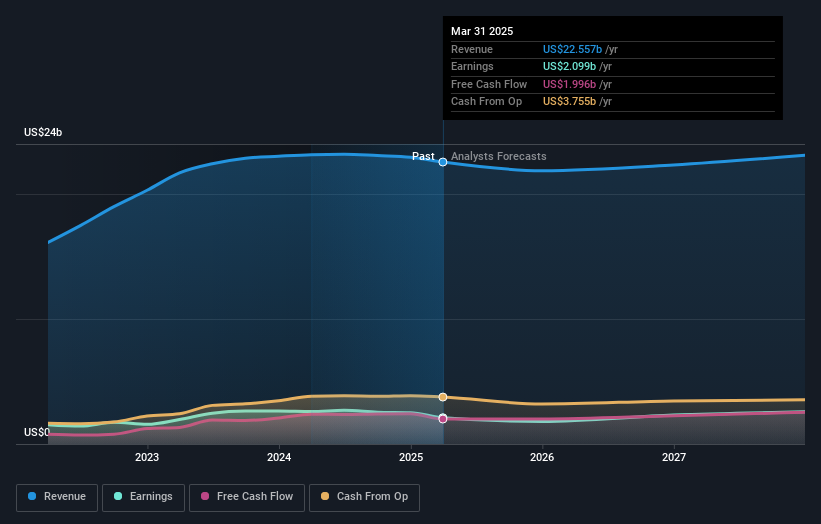Halliburton Company Just Missed Earnings - But Analysts Have Updated Their Models
Halliburton Company (NYSE:HAL) shareholders are probably feeling a little disappointed, since its shares fell 5.8% to US$20.65 in the week after its latest first-quarter results. Results overall were not great, with earnings of US$0.24 per share falling drastically short of analyst expectations. Meanwhile revenues hit US$5.4b and were slightly better than forecasts. Earnings are an important time for investors, as they can track a company's performance, look at what the analysts are forecasting for next year, and see if there's been a change in sentiment towards the company. We've gathered the most recent statutory forecasts to see whether the analysts have changed their earnings models, following these results.
Our free stock report includes 2 warning signs investors should be aware of before investing in Halliburton. Read for free now.
Taking into account the latest results, the current consensus, from the 24 analysts covering Halliburton, is for revenues of US$21.9b in 2025. This implies a measurable 3.1% reduction in Halliburton's revenue over the past 12 months. Statutory earnings per share are expected to decline 13% to US$2.12 in the same period. Before this earnings report, the analysts had been forecasting revenues of US$22.0b and earnings per share (EPS) of US$2.61 in 2025. The analysts seem to have become more bearish following the latest results. While there were no changes to revenue forecasts, there was a real cut to EPS estimates.
View our latest analysis for Halliburton
The average price target fell 5.9% to US$29.90, with reduced earnings forecasts clearly tied to a lower valuation estimate. The consensus price target is just an average of individual analyst targets, so - it could be handy to see how wide the range of underlying estimates is. Currently, the most bullish analyst values Halliburton at US$38.00 per share, while the most bearish prices it at US$22.00. This shows there is still a bit of diversity in estimates, but analysts don't appear to be totally split on the stock as though it might be a success or failure situation.
Another way we can view these estimates is in the context of the bigger picture, such as how the forecasts stack up against past performance, and whether forecasts are more or less bullish relative to other companies in the industry. We would highlight that revenue is expected to reverse, with a forecast 4.1% annualised decline to the end of 2025. That is a notable change from historical growth of 9.1% over the last five years. Compare this with our data, which suggests that other companies in the same industry are, in aggregate, expected to see their revenue grow 3.5% per year. So although its revenues are forecast to shrink, this cloud does not come with a silver lining - Halliburton is expected to lag the wider industry.
The Bottom Line
The biggest concern is that the analysts reduced their earnings per share estimates, suggesting business headwinds could lay ahead for Halliburton. Fortunately, the analysts also reconfirmed their revenue estimates, suggesting that it's tracking in line with expectations. Although our data does suggest that Halliburton's revenue is expected to perform worse than the wider industry. Furthermore, the analysts also cut their price targets, suggesting that the latest news has led to greater pessimism about the intrinsic value of the business.
With that in mind, we wouldn't be too quick to come to a conclusion on Halliburton. Long-term earnings power is much more important than next year's profits. We have forecasts for Halliburton going out to 2027, and you can see them free on our platform here.
And what about risks? Every company has them, and we've spotted 2 warning signs for Halliburton you should know about.
Have feedback on this article? Concerned about the content? Get in touch with us directly. Alternatively, email editorial-team (at) simplywallst.com.
This article by Simply Wall St is general in nature. We provide commentary based on historical data and analyst forecasts only using an unbiased methodology and our articles are not intended to be financial advice. It does not constitute a recommendation to buy or sell any stock, and does not take account of your objectives, or your financial situation. We aim to bring you long-term focused analysis driven by fundamental data. Note that our analysis may not factor in the latest price-sensitive company announcements or qualitative material. Simply Wall St has no position in any stocks mentioned.
 Wall Street Journal
Wall Street Journal